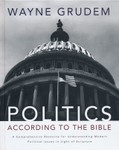Voting in a democratic society is an inestimable privilege, but at times it can seem like an overwhelming burden. Every election season, I must decide where I stand on a wide variety of issues I know woefully little about. Suddenly I find myself wishing I were an expert in economics, ethics, environmental science, international diplomacy, and a host of other subjects just so I can render an intelligent decision!
As with other decisions in life, I try to make my voting decisions in accordance with my religious principles. Yet with almost every issue, both sides appeal to the teaching of the Bible to justify their particular viewpoint. Some of these biblically-based arguments I may find compelling; others seem like a bit of a stretch. But why? Is my acceptance or rejection of these arguments based on my own sound exegesis and clear reasoning? Or am I simply more likely to respond to certain kinds of Biblical appeals because of my own uncritical assumptions, emotional reactions, and the influence of my religious community? Sometimes I wonder.
Thankfully, I only have to worry about how I cast my own vote. Those of you in a position of religious leadership—pastors, rabbis, seminary professors, and teachers—may find yourself being asked for guidance when it comes to how your people should vote. Worse still, you may be asked questions about economic policy by congregants who know more about economics than you do, questions about medical ethics by doctors and nurses, questions about the environment by those who have made it their study, etc. How can you help the people under your care apply the Bible to their political decisions without getting in over your head?

After laying this foundation, Grudem devotes the rest of the book to specific political issues, organized under broad topical heads. For example, a chapter on the protection of life deals with everything from abortion to euthanasia to capital punishment. A chapter on economics deals with everything from private property to business to taxes to healthcare. Each of these discussions is relatively concise and self-contained, enabling you to look up an issue without having to read the book from cover to cover. These discussions are helpful in pointing back to the foundational principles discussed earlier in the book, while also introducing specific details about the issue being discussed. Thus, even if you don’t agree with Grudem’s conclusions, you can use this resource to get a concise summary of the issue and to find passages of the Bible which speak to it.

